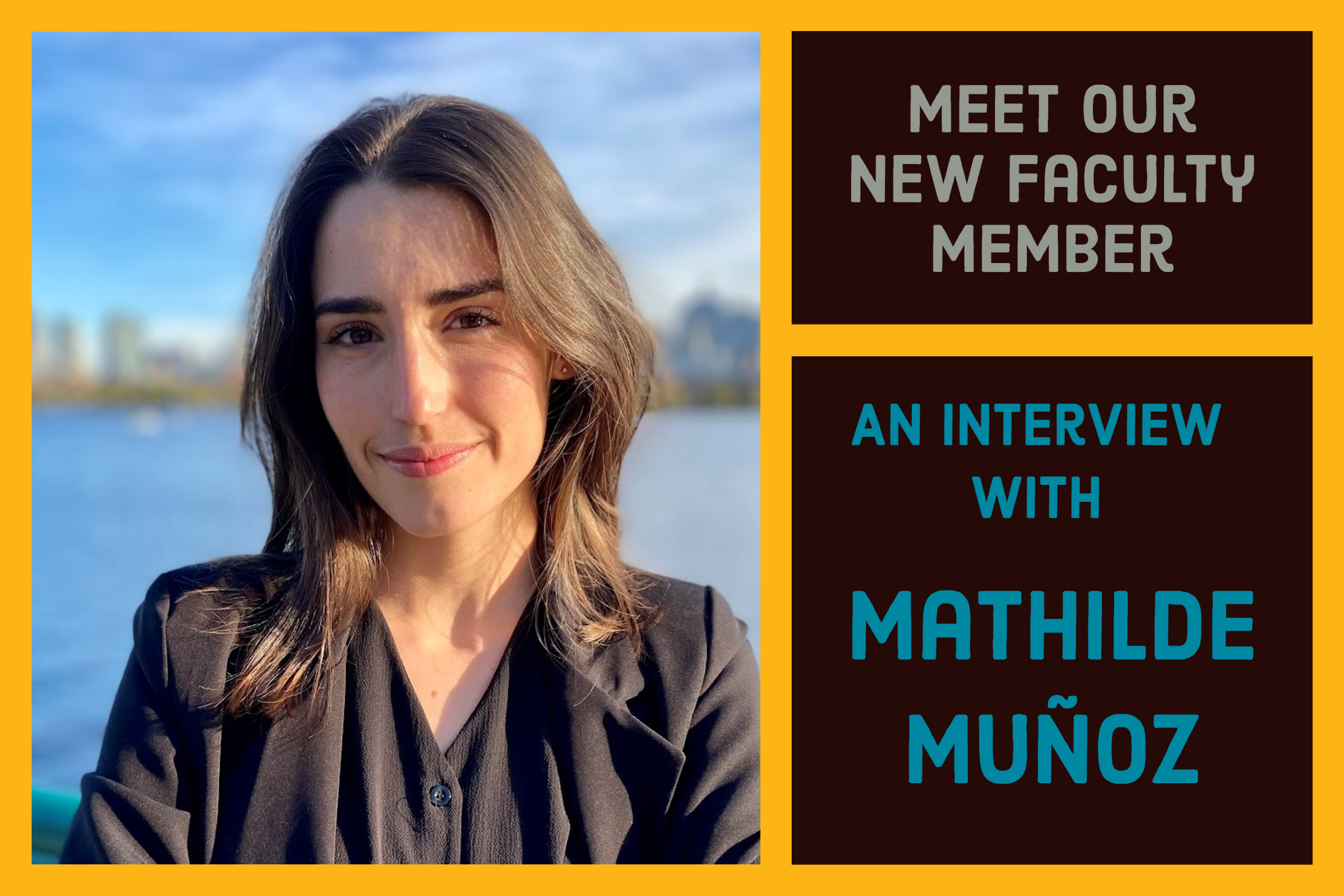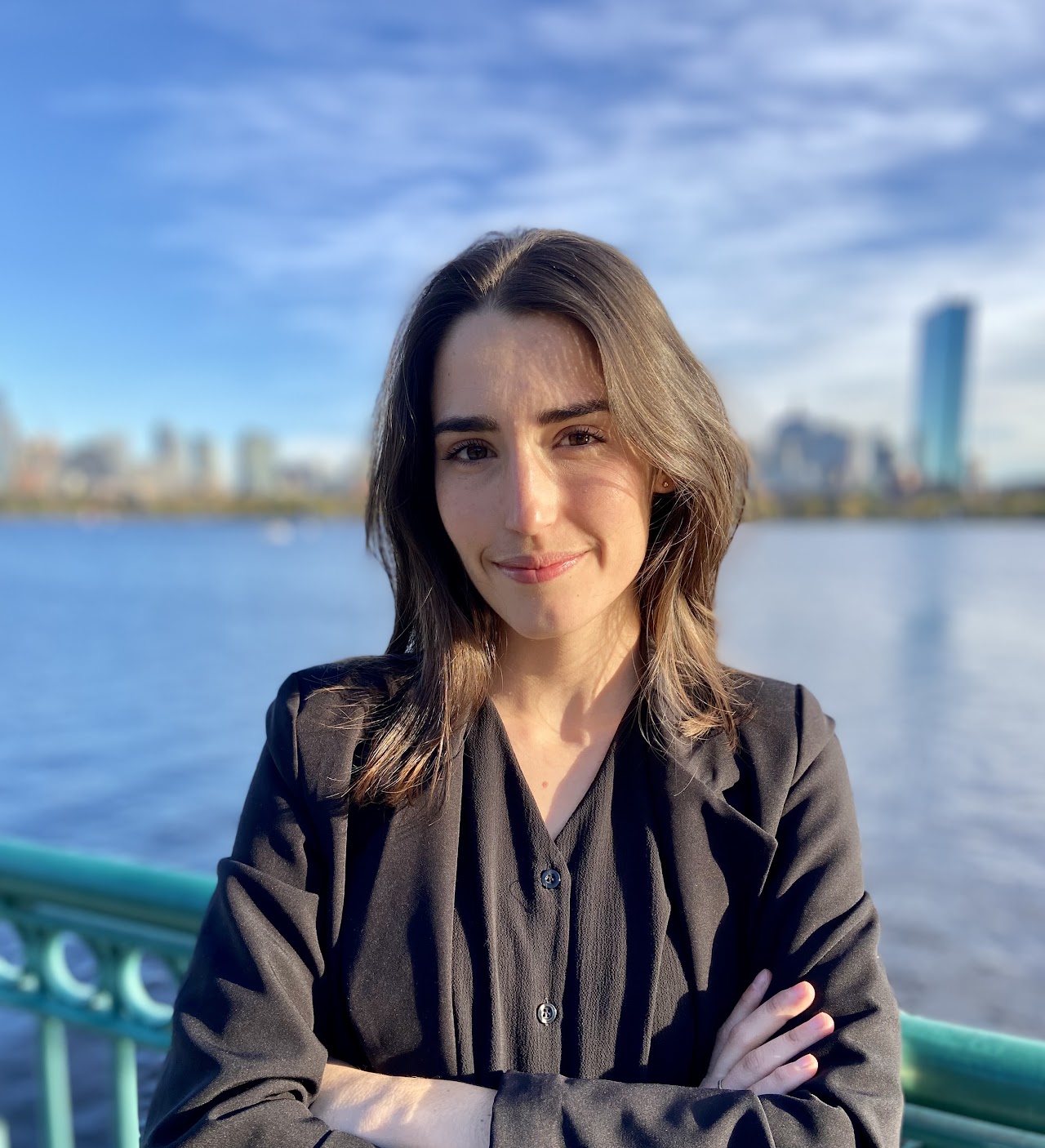Mathilde Muñoz joins Berkeley Economics
Mathilde Muñoz will join Berkeley’s Economics Department as an Assistant Professor in 2023, after spending the 2022-2023 academic year as a Post-Doctoral fellow at The James M. and Cathleen D. Stone Center on Wealth and Income Inequality at UC Berkeley. In this interview, PhD student Cristóbal Otero welcomes Dr. Muñoz to the department with an interview about her work.

How did you decide to study economics and pursue a PhD? What are the topics you are most interested in and why?
It’s hard to tell but growing up in Toulouse, somehow I felt that economics was always in the background because of the Toulouse School of Economics and the role it has there. Pursuing a PhD, however, not an obvious choice at all for me – nobody in my family held a PhD and I never thought about it as an option, to be honest. I got lucky because after I graduated from my master’s, the French government offered me an additional year of funding to work as a research assistant abroad. I had a job in banking lined up but decided to take this opportunity and work one year at the London School of Economics and Political Science (LSE) for Camille Landais. Two weeks after starting, I knew that research was for me and banking was not an option anymore. It’s also in London that I started thinking about the international mobility of workers and its potential implications for tax and transfer policies. I was always interested in the history of European integration, probably because my grandparents emigrated from Spain when my grandfather found a job in a French wood cutting factory in the 60s. I arrived in London a few months after Brexit and the political divide on European immigration was still so vivid there. The same year in France, the political debate was focused on posted workers, and I could not understand why we had a very different political equilibrium, with a left-wing consensus against posting policies and what was called social dumping, which is why I started thinking about this question in the first place. Broadly speaking, I’d say that I am mostly interested in the redistributive implications of workers moving across borders, either through international trade or international migration, and the challenges it poses for modern tax policy.
It's usually argued that globalization increases aggregate welfare, but as you eloquently discuss in your Job Market Paper, liberalization comes hand in hand with winners and losers. Do you think there are smart ways to compensate economic losers while still advocating for globalization? For example, how should we think about the trade-off between the economic gains of the exporting countries versus the losses of blue-collar workers in host countries of posting policies?
I think that the curse of globalization - to generate diffuse welfare gains but concentrated losses- makes it hard to advocate for liberalization without compensation. My job market paper shows that trade liberalization in services generates large export, wages and profits gains in low-wage countries, decreases employment in exposed sectors and local labor markets in high-wage countries, and has positive welfare effects for European consumers in aggregate. How we think about weighing those effects ultimately depends on the social welfare function we choose at the European level, something that is hard to identify in itself. Because the countries exporting services and the workers who move to perform them are on average poorer, we may want to put more weight on their gains if Europeans have a preference for redistribution. At the same time, we know that support for European integration is correlated with income in high wage member states, and uncompensated losses from increased trade integration may thus threaten the European project in the long run.
I cannot say what welfare function we want to choose, but I do believe that economists can give insights on what type of policies can mitigate those effects. A first path is pure compensation of losers, and one could think about designing inter member states transfers that compensate the loosers in the short run. It could be funded at the union level the way structural funds are, for instance. Another (perhaps more ambitious) idea is to improve the way our labor markets react to supply shocks. For instance, improving geographic mobility and how well workers reallocate across jobs could make the losses disappear or become marginal in the long run. This can be done with training programs, mobility subsidies or even broader housing policies. Another important idea, that in my opinion should be explored more in our current debates about globalization, is for policy makers to distinguish what part of international competition is driven by regulation and tax dumping as compared to other forces such as productivity and so on. For the specific case of posting policies, regulating how much firms can undercut taxes and labor market regulations of the host country could allow to change the nature of the foreign competition.
A general implication of my work is that the rules we set when allowing for foreign competition on the labor market directly shape the magnitude and type of losses suffered in some host countries. The concentrated losses from globalization are not a given parameter but are rather affected by the way we design and regulate international competition, in trade or migration agreements.
In one of your papers, you discuss the effects of tax competition on welfare. One interesting take is that low-income workers do not benefit from tax competition under any scenario and are hit the hardest. How do you think countries can harness tax competition in a way that benefits the poor? Do you think this is possible, or there is little scope for policy to change it?
The idea of this work is to show that when workers move across borders while countries set their tax rates individually, the equilibrium level of taxes is always lower than in a world with free mobility but tax coordination is enforced. Because poor people receive most of their consumption through transfers, even a small variation in tax revenues due to this globalization effect can in fact lead to substantial welfare losses at the very bottom of the distribution. It’s hard to think about one way tax competition can benefit the poor, unless we allow in our model for some preferences for different levels of redistribution. If we believe some poor people want to sort themselves in countries with lower level of taxes purely because of given preferences, then in theory tax competition could dominate tax coordination for those people at the bottom of the income distribution. But this type of assumption is hard to reconcile with the available empirical evidence, and some economists like Stefanie Stantcheva are now doing extremely important work trying to measure how people think about redistribution.
Enforcing tax cooperation may be hard in some contexts but less so in areas like the European Union where member states have already committed to be part of one common market. In joint work with Henrik Kleven, Camille Landais and Stefanie Stantcheva we show that there are very simple ways to lower tax competition incentives on labor; for instance, we could just ban preferential tax schemes targeted at rich immigrants that have been implemented in almost half of member states as of today.
Now, there are also more ambitious paths that could be taken regarding tax competition. Labor markets: if countries managed to agree on minimum levels of corporate profits taxation, it’s plausible that we could also establish minimum standards for labor taxes and regulations. For a long time, the debate on tax competition has broadly been focused on capital taxation because capital is much more mobile than labor. As labor markets become more and more integrated and mobility of workers is rising, I believe that discussions on international tax cooperation will soon consider capital and labor taxation jointly. Recent changes in the way we think about employment, work and residency will also be very challenging for tax policy. When workers live in one state but are formally employed in another, because they can for instance work remotely, where should social security contributions, income taxes and labor market regulations be set? I think my doctoral dissertation shows the distortions that can potentially arise when taxation and labor market regulations are set in the formal country of employment while workers are effectively working somewhere else.
Berkeley Economics seems to be a stronghold for theoretically guided but empirically minded research. For example, Christina Romer and David Romer pioneered the famous narrative approach to study fiscal policy in a credible way. David Card won the Nobel prize for his contribution to the so-called revolution of empirical economics. Emi Nakamura and Jon Steinsson bring microeconomic data to test the empirical implications of macroeconomic price-setting models. In my opinion, your work does a fantastic job of building a bridge between theoretical trade models and data. Was this empirically-minded tradition at the Department important for your decision to come to Berkeley?
This was absolutely fundamental in my decision. In my two main fields, public finance and international trade, Emmanuel Saez revolutionized the field with his 2001 paper that was the first to connect optimal taxation theories with data, and Andres Rodriguez-Clare and his co-authors showed that very general trade models can quantify gains from trade using widely available empirical moments. Those sufficient statistics approaches are very powerful because they allow to quantify policy-relevant questions with simple estimates. I also think that theory and empirics allow us to identify different answers sometimes to the same question. For instance, reduced form analysis is a very useful tool to convincingly estimate the local effects of a shock, but by assumption any difference in difference model will not capture general equilibrium changes that could affect all labor markets in a very diffuse way. To tackle those general equilibrium forces, you need a model or at least some structure. So being in a department where there is a joint tradition of very good empirical work and of linking theory to data was very important for me.
You have shared the story of your grandfather, who grew up under incredibly challenging economic conditions. What inspires you about his story and has it had a connection to your interest in pursuing economics as a field of research?
There are so many inspiring things about his story, and he was so much more than that as well. He lost his two parents very young and had to start working at the age of 10, hence he could never go to school and never learned how to read nor write. He spent more than 50 years cutting wood, a job that he loved but one that was also very tough. I, on the contrary, will have the privilege to spend most of my life at school, and to choose what I work on everyday. I always thought that one way I can pay him back for all the sacrifices he made is to use my privilege to produce good work that can help document important economic phenomena that affect people’s life. I think being a researcher allows you to work on what you think is deeply important, and you can somehow contribute to make things work better. Coming from this background, I would have never been able to pursue this career without all the mentors I was fortunate to meet along the way. I chose the academic path not only because I love research but also because I hope that one day I can be this mentor for students that need it the most the way I needed my mentors when I found them. Obviously his story is also a fantastic historical lesson for what my research is about. Writing papers on migration, European integration and trying to put numbers on lives like his, is also a way for me to pay tribute to that story.
Do you have any words of advice for students starting their PhD?
The best way to be creative is to focus on interesting questions, not on writing papers that just try to look like those you read. You should decide what to work on based on how important you think the question is, not on what you believe the final paper will look like or how it will be published. Your advisor is the one person who can help you keep your focus on the topics, rather than on anything else: Thomas Piketty, for me, played that role.
You should also try to talk to as many different people working in as many fields as you can, theorists and empiricists alike, to learn how to use new tools and ask questions in a different way. In my case, starting from public finance, meeting people like Arnaud Costinot or Thomas Chaney who taught me how to think like a “trade economist” was essential in shaping my thinking and opening my horizons.
Mathilde Muñoz will join Berkeley’s Economics Department as an Assistant Professor in 2023, after spending the 2022-2023 academic year as a Post-Doctoral fellow at the Stones Center. In this interview, PhD student Cristóbal Otero welcomes Dr. Muñoz to the department with an interview about her work and future directions.


